Are We on Track? XTE and Maritime Education and Training
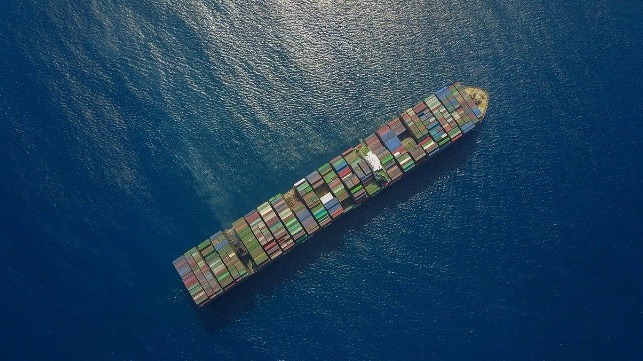
[By Sukhjit Singh, Jillian Carlson-Jackson, Vivian Rambarath-Parasram, Mikael Lind, Wolfgang Lehmacher, Richard T. Watson, Sandra Haraldson and Omar Frits Eriksson]
“Cross Track Error (XTE or off course) is the distance that vessel is off the course either to port or starboard. It is usually caused by drift due to environmental factors. Those involved in maritime operation will understand, how important it is to be aware of XTE, as it is at the core of corrective action."
The maritime industry is experiencing a paradigm shift while operating in an everchanging environment influenced by digitalization and decarbonization. Technological developments, particularly the new digital technologies and Industry 4.0, are rapidly reshaping the maritime industry. As the industry responds to this shift, are we experiencing a XTE in our approach to maritime education and training?
Academic drift describes the process whereby knowledge that has been useful gradually loses close ties to practice by becoming more tightly integrated with a body of scientific knowledge.[1] Monitoring academic drift is critical to ensuring the skills of maritime professionals are aligned to the changing needs of the industry. Maritime Education and Training (MET) must evolve to provide training, and retraining, that is relevant to practice.
A changing global maritime landscape
The ongoing pandemic has highlighted the indispensable role that the maritime industry plays in the global economy. Seafarers are at the heart of shipping and are the critical element in operating today’s modern and technologically sophisticated ships safely and efficiently. Maritime shipping operates in a complex eco-socio-technical environment, with stringent international regulations that reacts to, economic, political, and socially variable conditions.
Safety of navigation services provided by authorities are becoming more digital and complex in their nature. New skills are needed both to consume and to provide such services which may include highly automated and intelligent aids to navigation and vessel traffic services.
The maritime transport has been identified as a laggard sector in the Industry Digitalisation Index.[2] Recent regulatory and sustainability demands have provided the momentum to fully embrace digital transformation. Within the constructs of global trade, the interactions of producers, manufacturers and consumers are in flux, and consequently, the expectations of maritime shipping are changing. However, the traditional structured and measured approach of implementing technologies is no longer able to keep pace with the rate of change. This change creates a need for new skills and competencies for maritime professionals – both afloat and ashore. Shipping requires a quality, motivated and appropriately skilled labor force[3] to thrive, and therefore, requires revision and alignment of the education and training of seafarers to meet the changing requirements. MET must provide appropriate knowledge and expertise to create a ‘future ready’ maritime workforce to meet the needs of diverse stakeholders (Figure 1).
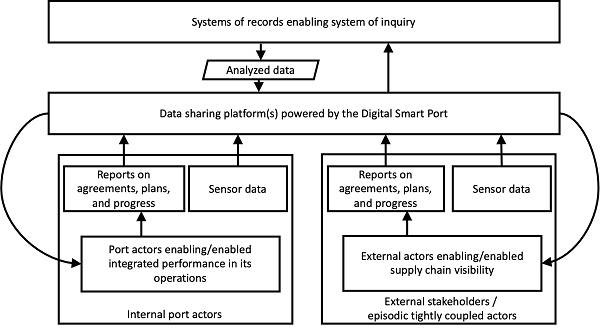
Figure 1: Diverse Maritime Workforce stakeholders
The emerging global maritime landscape is characterized by an enhanced degree of interaction and synchronization among the multiple players engaged in the self-organized ecosystem[4] of maritime transports. The performance of port community systems largely depends on the capacity, collaboration, and participation of the port community members[5] and on the collaboration of the carriers.
Thinking around maritime education is evolving
Augmented reality, artificial intelligence, autonomous operations, and big data are becoming part of maritime operations. Traditionally, MET institutes cater to the requirements of the International Convention on Standards of Training, Certification and Watchkeeping for Seafarers (STCW) regulations, when developing curricula of training focusing on the delivery of IMO Model Courses. The STCW Convention and Code (as amended) sets out the current international benchmark for the training and education of seafarers.[6] The 2010 Manila amendments to the STCW Convention and Code marked a major revision of the STCW Convention and Code. These amendments were aimed at bringing the Convention and Code up to date with recent and foreseeable developments. However, the pace of operational and technological advances in the maritime operations in recent years continues to accelerate. This means ships, ports and logistics hubs have become sophisticated sensor hubs and data generators.[7] The ship and shore now digitally interact real time. While compliance with STCW standards is essential, the industry’s diverse stakeholders need maritime education and training that aligns with ongoing technological changes and raise the industry’s capital productivity.
Changing technology and customer expectations requires an MET course correction. Traditional curriculum design influenced by the technological integration needs to reflect, and be inspired by, the ongoing innovation in the industry. The use of simulators in maritime education and training, for instance, has been an essential component for developing seafarer’s skills and competencies for decades. Emerging immersive technologies, such as virtual reality (VR) and augmented reality (AR) create new and exciting possibilities for maritime training.
Digitalization and automation are transforming the shipping sector. Ships, ports and maritime logistics are increasingly data enabled and need a work force that can use data analytics to turn data streams into information for enhanced decision making. Employees, at all levels, need new competencies to effectively manage a digitally enabled sustainable transport system.
A new curriculum grounded in the skill needs of the future
The theme of maritime informatics[8] is uniting practitioners and academics to jointly contribute towards upgrading the human capital required by an increasingly digital industry. Environmental and technological changes demand a series of perspective transitions to training, as depicted in the following diagrams.
Learning Strategy – From Fragmented learning to Learn to learn 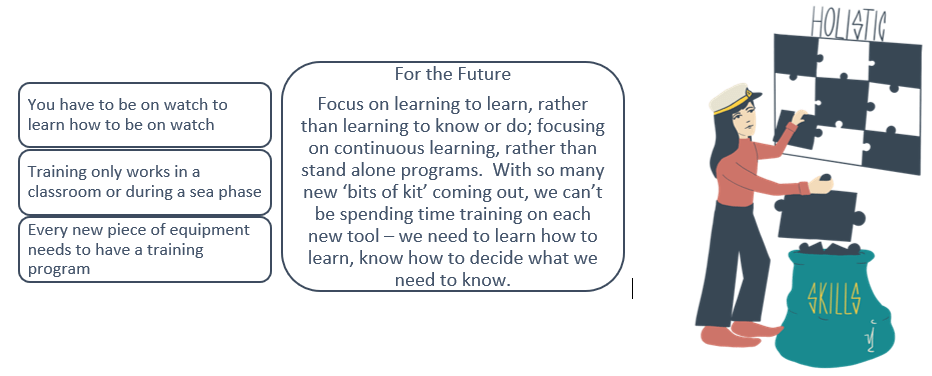
Learning Perspective – From Imitative learning to continuous learning for future

Evolving roles – From Back to Basics to Basics of the future
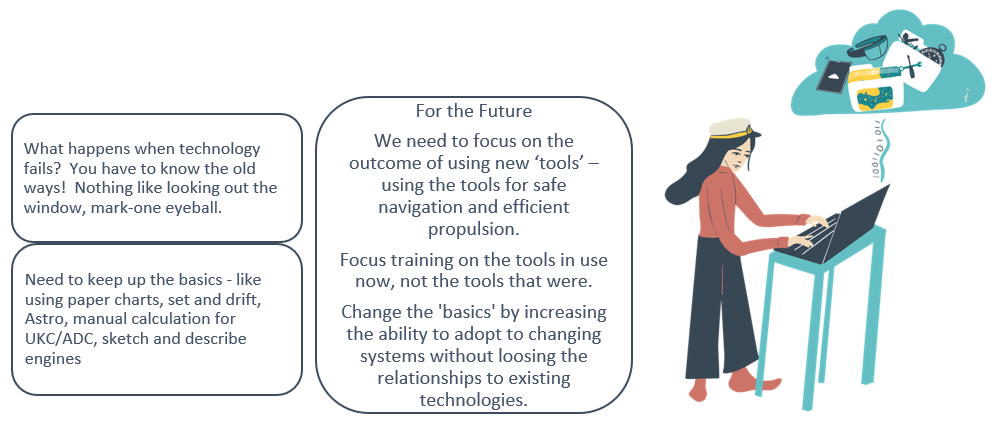
Battle of the Ss – From Exclusion to Inclusion
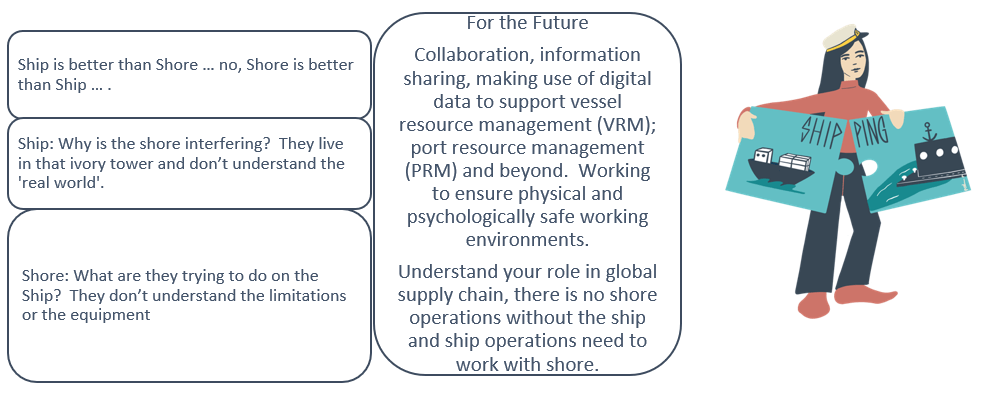
Digesting Data – From Data ingestion to Data analytics
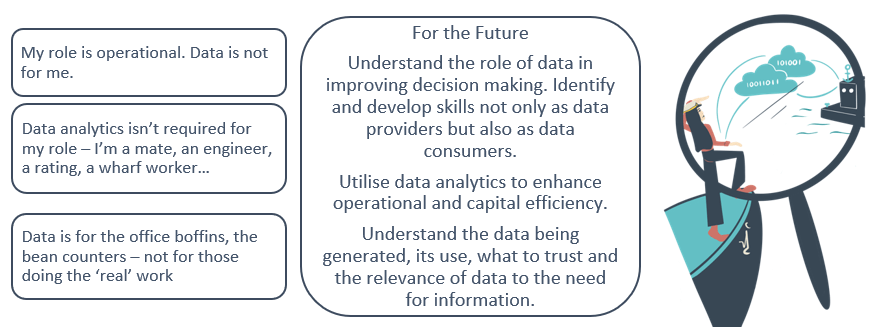
Developing economies
A significant percentage of the world’s seafarers come from the developing economies. Due to the lack of institutional infrastructure and capacity, MET institutions in these economies struggles to meet even existing standards. Therefore, it is imperative to address this lack of capability along with ensuring that knowledge transfers are nurtured through multilateral relationships that cross the digital divide. There are opportunities to develop cooperative endeavors, making effective use of tools and technology to close the existing gap. It is time to facilitate a truly global digital revolution in the maritime sector to build a maritime workforce that has the skill sets to embrace the range of environmental, social, and technological developments.
Education in transition
The world’s maritime educational institutions need to respond to the current eco-socio-technical disruptions by producing relevant, industry ready graduates with ‘future ready’ skill sets. The training must evolve to be cognizant of the impacts of the 4th revolution on the maritime industry and the role of MET in enabling the adoption and implementation of relevant technology and addressing new expectations. Harnessing these capabilities is critical to deliver digitalized and decarbonized future ready ships and ports. Revolutions are an abrupt change in past practices, and we assert that the maritime sector’s future will be determined by its willingness to redirect the course of established MET patterns to get on track for a productive future.
A version of this article will appear in Seaways, the Magazine of The Nautical Institute
About the authors
Capt. Sukhjit Singh is an experienced master mariner and applied researcher with over 25 years in the shipping industry and maritime sector. He is also current Head of School (Maritime Science) at the University of Gibraltar and supports various international capacity building projects as a technical expert.
Jillian Carson-Jackson is an experienced navigation officer, maritime professional and author of ‘The Simulation Instructor’s Handbook’ (published by the Nautical Institute). She is active in both training and digital developments with a focus on evolving on-line training opportunities and digital data developments for the maritime industry.
Vivian Rambarath-Parasram is an Attorney at Law with over 25 years’ experience in Maritime law, international environmental law, corporate governance and commercial law. She has been affiliated with The University of Trinidad and Tobago since 2007 and is currently heading the Centre for Maritime and Ocean Studies.
Mikael Lind is the world’s first Professor of Maritime Informatics and is engaged at Chalmers, Sweden, and is also Senior Strategic Research Advisor at Research Institutes of Sweden (RISE). He serves as an expert for World Economic Forum, Europe’s Digital Transport Logistic Forum (DTLF), and UN/CEFACT. He is the co-editor of the first book of maritime informatics and the follow-up book recently published by Springer.
Wolfgang Lehmacher is operating partner at Anchor Group. The former head of supply chain and transport industries at the World Economic Forum and President and CEO Emeritus of GeoPost Intercontinental is advisory board member of The Logistics and Supply Chain Management Society, ambassador of The European Freight and Logistics Leaders' Forum, and founding member of the think tanks Logistikweisen and NEXST.
Richard Watson is a Regents Professor and the J. Rex Fuqua Distinguished Chair for Internet Strategy at the University of Georgia. He is a former President of the Association for Information Systems and was awarded its highest honor, a LEO, for his achievements in information systems.
Sandra Haraldson is Senior Researcher at Research Institutes of Sweden (RISE) and has driven several initiatives on digital collaboration, multi-business innovation, and sustainable transport hubs, such as the concept of Collaborative Decision Making (e.g. PortCDM, StationCDM, YardCDM) enabling parties in transport ecosystems to become coordinated and synchronised by digital data sharing.
Omar Frits Eriksson has over 30 years’ experience of working with safety of navigation. He is the Dean of the IALA World-Wide Academy and deputy Secretary-General of IALA ,which provides model courses for Aids to Navigation managers and VTS training.
Illustrations: Sandra Haraldson
References
[1] Harwood, J. (2010). Understanding Academic Drift: On the Institutional Dynamics of Higher Technical and Professional Education. Minerva, 48(4), 413–427. http://www.jstor.org/stable/41821533
[2] Morgan Stanley (2016) Morgan Stanley's Digitalization Index in Riding the Long Tail of the Digital Revolution. Available at: https://www.morganstanley.com/ideas/digital-revolution-big-data-iot-productivity.html
[3] https://www.imo.org/en/MediaCentre/PressBriefings/Pages/39-WMD-2015-.aspx
[4] Watson R. T., Lind M., Delmeire N., Liesa F. (2020), Shipping: A Self-Organising Ecosystem, in M. Lind, M. Michaelides, R. Ward, R. T. Watson (Ed.), Maritime informatics. Heidelberg: Springer (https://maritimeinformatics.org/2020/10/maritime-informatics/)
[5] The World Bank, 2020. “Accelerating Digitization: Critical Actions to Strengthen the Resilience of the Maritime Supply Chain.” World Bank, Washington, DC. License: Creative Commons Attribution CC BY 3.0 IGO
[6] https://www.imo.org/en/OurWork/HumanElement/Pages/STCW-Conv-LINK.aspx

that matters most
Get the latest maritime news delivered to your inbox daily.
[7] Singh S., Sengupta B. (2021) Sustainable Maritime Transport and Maritime Informatics. In: Lind M., Michaelides M., Ward R., T. Watson R. (eds) Maritime Informatics. Progress in IS. Springer, Cham. https://doi.org/10.1007/978-3-030-50892-0_6 and Lind M., Lehmacher W., Haraldson S., Fu X., Zuesongdham P., Huesmann R., Fich S. (2020) Smart ports as lighthouse nodes of supply chain networks, Port Technology International - The e-journal of ports and terminals, Edition 104-2020 (https://www.porttechnology.org/technical-papers/smart-ports-as-lighthouse-nodes-of-supply-chain-networks/)
[8] Lind M., Watson R., Hoffmann J., Ward R., Michaelides M. (2020) Maritime Informatics: an emerging discipline for a digitally connected efficient, sustainable and resilient industry, Article No. 59 [UNCTAD Transport and Trade Facilitation Newsletter N°87 - Third Quarter 2020] (https://unctad.org/en/pages/newsdetails.aspx?OriginalVersionID=2456)
The opinions expressed herein are the author's and not necessarily those of The Maritime Executive.
